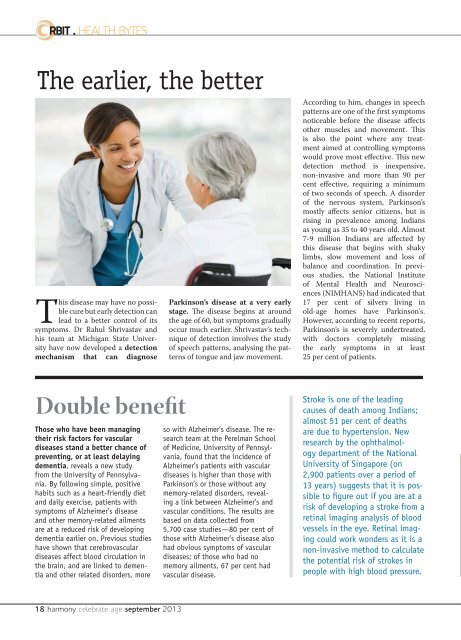Sept_13
Sept_13
Sept_13
Create successful ePaper yourself
Turn your PDF publications into a flip-book with our unique Google optimized e-Paper software.
RBIT . HEALTH BYTES<br />
The earlier, the better<br />
This disease may have no possible<br />
cure but early detection can<br />
lead to a better control of its<br />
symptoms. Dr Rahul Shrivastav and<br />
his team at Michigan State University<br />
have now developed a detection<br />
mechanism that can diagnose<br />
Parkinson’s disease at a very early<br />
stage. The disease begins at around<br />
the age of 60, but symptoms gradually<br />
occur much earlier. Shrivastav’s technique<br />
of detection involves the study<br />
of speech patterns, analysing the patterns<br />
of tongue and jaw movement.<br />
According to him, changes in speech<br />
patterns are one of the first symptoms<br />
noticeable before the disease affects<br />
other muscles and movement. This<br />
is also the point where any treatment<br />
aimed at controlling symptoms<br />
would prove most effective. This new<br />
detection method is inexpensive,<br />
non-invasive and more than 90 per<br />
cent effective, requiring a minimum<br />
of two seconds of speech. A disorder<br />
of the nervous system, Parkinson’s<br />
mostly affects senior citizens, but is<br />
rising in prevalence among Indians<br />
as young as 35 to 40 years old. Almost<br />
7-9 million Indians are affected by<br />
this disease that begins with shaky<br />
limbs, slow movement and loss of<br />
balance and coordination. In previous<br />
studies, the National Institute<br />
of Mental Health and Neurosciences<br />
(NIMHANS) had indicated that<br />
17 per cent of silvers living in<br />
old-age homes have Parkinson's.<br />
However, according to recent reports,<br />
Parkinson’s is severely undertreated,<br />
with doctors completely missing<br />
the early symptoms in at least<br />
25 per cent of patients.<br />
Double benefit<br />
Those who have been managing<br />
their risk factors for vascular<br />
diseases stand a better chance of<br />
preventing, or at least delaying<br />
dementia, reveals a new study<br />
from the University of Pennsylvania.<br />
By following simple, positive<br />
habits such as a heart-friendly diet<br />
and daily exercise, patients with<br />
symptoms of Alzheimer’s disease<br />
and other memory-related ailments<br />
are at a reduced risk of developing<br />
dementia earlier on. Previous studies<br />
have shown that cerebrovascular<br />
diseases affect blood circulation in<br />
the brain, and are linked to dementia<br />
and other related disorders, more<br />
so with Alzheimer’s disease. The research<br />
team at the Perelman School<br />
of Medicine, University of Pennsylvania,<br />
found that the incidence of<br />
Alzheimer’s patients with vascular<br />
diseases is higher than those with<br />
Parkinson’s or those without any<br />
memory-related disorders, revealing<br />
a link between Alzheimer’s and<br />
vascular conditions. The results are<br />
based on data collected from<br />
5,700 case studies—80 per cent of<br />
those with Alzheimer’s disease also<br />
had obvious symptoms of vascular<br />
diseases; of those who had no<br />
memory ailments, 67 per cent had<br />
vascular disease.<br />
Stroke is one of the leading<br />
causes of death among Indians;<br />
almost 51 per cent of deaths<br />
are due to hypertension. New<br />
research by the ophthalmology<br />
department of the National<br />
University of Singapore (on<br />
2,900 patients over a period of<br />
<strong>13</strong> years) suggests that it is possible<br />
to figure out if you are at a<br />
risk of developing a stroke from a<br />
retinal imaging analysis of blood<br />
vessels in the eye. Retinal imaging<br />
could work wonders as it is a<br />
non-invasive method to calculate<br />
the potential risk of strokes in<br />
people with high blood pressure.<br />
18 harmony celebrate age september 20<strong>13</strong>


